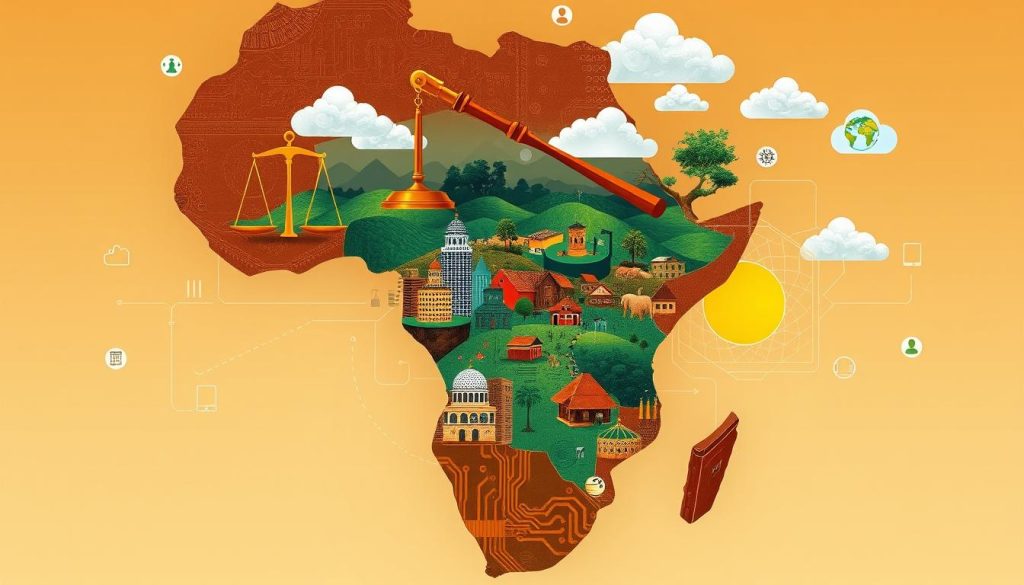Tech entrepreneurship in Africa is getting a lot of attention lately. The continent is quickly becoming a centre for new ideas. Starting a tech startup here is not just exciting; it’s a chance to make a real difference.
The African Development Bank says Africa’s tech scene is growing fast. This shows there’s a lot of potential for new businesses.
This guide will look at the world of African innovation. We’ll talk about the chances and challenges of starting a business here. We’ll see how technology can help grow the economy and improve lives in Africa.
Understanding the Tech Startup Landscape in Africa

The tech startup scene in Africa is lively and changing fast. Countries like Kenya, Nigeria, and South Africa lead the way. They drive growth with new ideas. Each country has many startups that help the economy grow.
In Kenya, the Nairobi Innovation Hub brings entrepreneurs and tech fans together. Nigeria’s Lagos is known for its growing tech scene. Startups like Paystack and Flutterwave are big successes there. South Africa combines old and new companies, working together to solve problems.
Mobile tech and more people online are key to this growth. Young people across Africa are excited about tech. They want solutions that meet their needs. The National Association of Software and Service Companies says this mix is good for everyone. It lets startups learn from each other.
The Role of Technology in African Development

Technology is key to improving life in Africa. It changes how we do things in many areas. For example, in farming, new tech like precision farming helps farmers grow more food. This means less waste and better crops.
In healthcare, technology brings doctors to patients, not the other way around. This makes getting medical help easier and cheaper. It also helps more people get the care they need.
Education also gets a boost from technology. Online learning lets people learn anywhere, anytime. This is especially helpful in areas where schools are scarce.
M-Pesa is a big step forward in making money matters easier. It lets people send and receive money safely, even without a bank account. This has helped millions manage their finances better.
Studies show that new tech creates jobs and makes work more efficient. This is crucial for Africa, where jobs are hard to find. With the right tech, Africa can grow its economy and create more jobs.
Identifying Opportunities in African Markets

Spotting the huge market opportunities Africa offers is key for startups. The continent is growing fast in fintech, healthtech, agritech, and edtech. These areas are getting more investment, thanks to both local and global players.
Startups can do well by meeting local needs with their products. This way, they can offer new solutions to common problems. The need for better financial services, healthcare, farming, and education shows the potential in these emerging markets.
- Fintech: There’s a big chance in mobile payments and small loans.
- Healthtech: People want more in telemedicine and health management.
- Agritech: Tech that boosts crop yields and improves supply chains is attractive.
- Edtech: Digital learning and vocational training are needed for the young.
Africa’s varied needs mean it’s a great time for new ideas and businesses. By understanding local trends and what people want, startups can make a big difference. They can also benefit from the continent’s economic growth.
Starting a Tech Startup in Africa

Starting a tech startup in Africa is both exciting and challenging. Knowing which areas Africa is focusing on can help entrepreneurs find success. The continent is rich in opportunities, especially in logistics tech and e-commerce.
Key Sectors for Tech Innovation
Several sectors are key in Africa’s tech scene:
- Logistics Tech: As Africa updates its infrastructure, logistics tech companies are growing. They help move goods efficiently.
- E-commerce: With more people online, e-commerce is booming. It shows how shopping habits are changing.
- Digital Finance: Digital payments are changing finance. They make it easier for more people to access money.
Disrupt Africa’s research shows these areas are growing fast. It shows how tech innovation is changing Africa.
Market Trends to Watch
Entrepreneurs should watch these market trends in Africa:
- Sustainability: More startups are focusing on being green. They aim to help the environment.
- Digital Transformation: The move to digital is speeding up. It’s creating new chances in many areas.
- Consumer Behaviour Changes: Online shopping is changing how people buy things. It’s shaping business models.
Understanding these trends helps create products that meet consumer needs in a changing market.
Creating a Business Plan for Your Startup

Creating a solid business plan is crucial for any tech entrepreneur in Africa. A good business plan acts as a guide, helping you grow your startup and share your goals with investors. It’s important to understand Africa’s markets, including customer needs and trends.
Here are the main parts of your business plan:
- Market Analysis: Look into the competition and demographic trends to find chances.
- Business Model Development: Explain how your startup will offer value. Think about how you’ll make money.
- Financial Projections: Give realistic numbers for income, costs, and profits for the next years.
- Clear Objectives: Set clear goals to track your startup’s success.
- Identification of Target Customers: Know your customers and make products they want.
A study by the Global Entrepreneurship Monitor shows that a good business plan helps attract investors. By using detailed research in your plan, you build a strong base for your tech startup in Africa.
Fundamentals of Building a Tech Team

Creating a strong tech team is key for any startup’s growth. The right skills mix can boost innovation and project success. In Africa, companies need both technical and soft skills that match their goals. Important skills include coding, data analysis, project management, and digital marketing.
Skills Required for Tech Professionals
Founders should focus on certain skills to build a solid tech team:
- Strong programming skills in languages like Python, Java, and JavaScript.
- Proficiency in data management and analysis tools for better decision-making.
- Expertise in project management methods like Agile and Scrum to improve workflows.
- Digital marketing skills to reach and engage target audiences effectively.
Investing in these tech skills in Africa will boost the team’s ability to handle complex tasks and grow.
Diversity and Inclusion in the Tech Industry
Diversity in tech is now seen as crucial for innovation. Diverse teams offer different views, leading to more creative and effective solutions. Studies show that diverse tech teams often perform better, highlighting the benefits of inclusive hiring.
To build a diverse workplace, efforts are needed:
- Recruit from underrepresented groups in tech.
- Provide ongoing training and support for fair growth opportunities.
- Set up mentorship programmes that focus on inclusion at all levels.
By valuing diversity, startups can improve team dynamics and business success.
Navigating Legal and Regulatory Frameworks

Starting a tech startup in Africa means you have to understand many legal rules. You need to know the laws that affect how you run your business. This includes knowing how to register your company, which changes from place to place.
Getting the right permits is also key. Each startup must follow local tech laws and specific rules for their industry. Without the right permits, you might hit roadblocks that slow your growth.
Don’t forget about protecting your ideas. Keeping your innovations safe from copying is crucial. Learning about startup laws on intellectual property helps you protect and enforce your rights.
Staying in line with local laws is important for your business to last. Keep an eye on changes in laws to stay ahead. Websites like Enabling the Business of Agriculture offer tips on the laws that affect different businesses.
Accessing Funding and Investment Opportunities

Getting funding for startups in Africa offers many options. These are designed for the unique needs of tech entrepreneurs. Venture capital is becoming more popular, thanks to international investors interested in Africa’s tech growth. The African Private Equity and Venture Capital Association says this area is attracting more investment.
Angel investors are also key in supporting new businesses. They offer both money and guidance to entrepreneurs. Crowdfunding is another option, letting startups reach a worldwide audience and get the funds they need.
Government grants are a valuable resource for tech startups. They help stimulate innovation and support small businesses in Africa. These grants are crucial for startups needing initial capital to grow and launch their products.
To get investment in Africa, entrepreneurs need to improve their pitching skills. A good pitch should be short, clear, and show why your product is unique. It should also highlight the market size and any success you’ve had. As Africa’s tech venture capital grows, those who can pitch well will have a big advantage.
Leveraging Partnerships and Networking in Africa

Starting a tech startup in Africa needs strong networking and strategic partnerships. Working with local businesses, NGOs, and industry groups can boost growth. These connections help startups navigate Africa’s complex business world.
The advantages of making these connections are clear:
- Access to resources and expertise not available in-house.
- Chances to share knowledge and innovate together.
- More visibility and credibility through partnerships with well-known entities.
Many startups have seen the benefits of strong partnerships. For example, working with NGOs has helped tech firms understand community needs better. This leads to more relevant services and products. Industry associations also offer valuable networking and collaboration opportunities.
In conclusion, partnerships and networking are key to overcoming challenges and finding opportunities in Africa’s fast-changing market.
Marketing Your Tech Startup Effectively

Marketing is key for tech startups to stand out. The right strategies can boost visibility and connect with customers. Digital marketing in Africa is especially promising with its growing online presence.
Digital Marketing Strategies
A good digital marketing plan uses many tactics to reach your audience. Here are some important ones:
- Social Media Marketing: Sites like Facebook, Twitter, and Instagram are great for tech branding. Customising content for your audience can really help.
- Search Engine Optimisation (SEO): Making your website search-friendly boosts its visibility. Use the right keywords and create engaging content to attract clients.
- Content Marketing: Creating useful and interesting content shows you’re an expert in tech. Blog posts, infographics, and videos can draw people to your site and build trust.
Using digital channels can cut marketing costs a lot. Startups should make sure their marketing fits the local culture. This way, they can really connect with the African audience.
Challenges Faced by Tech Startups in Africa

The tech startup scene in Africa is full of hurdles. Limited infrastructure, like unreliable electricity and slow internet, makes it hard to grow. These problems need creative solutions to overcome.
Finding skilled workers is also tough. Many startups struggle to hire the right people. This delay affects their ability to develop and run efficiently.
Financing is another big issue. Getting money from local investors can be hard. Startups often look for funding elsewhere, like crowdfunding or grants.
But, there are ways to stay strong. Using local resources well and understanding the market can help. With the right approach, startups can thrive in Africa’s fast-changing market.
Success Stories of Tech Entrepreneurs in Africa

Africa is full of inspiring startup journeys. These show the resilience and innovation of its tech entrepreneurs. They have created successful businesses and made a big impact on their communities and the economy.
One great example is Flutterwave, a payments technology company from Nigeria. It has changed how businesses in Africa take payments. It makes transactions easier across borders, helping entrepreneurs reach global markets.
Seedstars Africa is another example. It helps develop innovative startups across the continent. Through mentorship and funding, Seedstars has helped many entrepreneurs succeed. Their work has led to the growth of scalable businesses that solve local problems and boost the economy.
- Building Community: Successful tech entrepreneurs often create strong networks that foster collaboration and support.
- Emphasising Innovation: Leveraging technology to solve real-world problems highlights the innovative spirit across Africa.
- Resilience: Many of these entrepreneurs overcame significant obstacles, demonstrating the importance of persistence in their inspiring startup journeys.
These success stories from Africa teach us valuable lessons. They inspire a new generation of tech entrepreneurs to chase their dreams. As more innovators come forward, the impact will only grow. This will make Africa even more known as a hub for technology and entrepreneurship.
Utilising Technology to Enhance Business Operations

Startups in Africa’s competitive business scene can greatly benefit from technology. The right tools can boost operational efficiency, making it crucial for new businesses.
Advanced software and platforms can streamline business processes:
- Productivity Tools: Apps like Trello and Slack improve team work. They allow for instant communication and project tracking.
- Customer Relationship Management (CRM): Tools like Salesforce help manage customer interactions. This builds stronger relationships and higher satisfaction.
- Data Analytics: Google Analytics gives insights into customer behaviour. This helps businesses make better decisions and improve services.
A study by the African Leadership University shows tech-embracing startups see big efficiency gains. They automate tasks and optimise workflows. This lets them quickly adapt to market changes, staying ahead in a fast-paced world.
Future Prospects for Tech Startups in Africa
The future of tech startups in Africa looks bright. The continent is rapidly changing digitally, with a strong innovation outlook. Experts predict a big increase in investment in Africa’s tech scene.
Reports from Deloitte show global investors are keen on Africa’s markets. This influx of money will boost innovation, create jobs, and grow the economy.
Technologies like artificial intelligence and blockchain are set to change the game. They can make operations smoother, improve services, and better customer experiences. Startups using these techs will lead in solving local problems, making a big impact on Africa’s economy.
Despite the positive outlook, challenges lie ahead for tech entrepreneurs in Africa. They must navigate laws, competition, and infrastructure issues. Yet, the growth of tech startups shows a shift towards a strong digital economy. This paves the way for a brighter future in Africa’s business world.
















